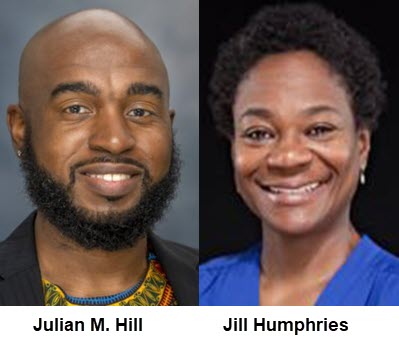Abstract
Excerpted From: Julian M. Hill and Jill Humphries, Summer NY 2020-- Black Legal Observers, Black Solidarity, 49 Harbinger 24 (March 4, 2024) (48 Footnotes) (Full Document)
 I served as a legal observer (a “LO”) for this Black-led direct action that was part of a campaign to pressure the New York City Council and Mayor DeBlasio to cut the then-$6 billion New York City Police Department budget by at least one billion dollars. Legal observers are lawyers, legal workers, law students, and others whom community organizers and activists invite to protests and other direct actions to document police interactions with protesters and, where necessary, obtain personal information from arrestees to ensure jail support can get them released as soon as possible. Their presence aims to deter illegal law enforcement behavior by showing that the community is watching and to engender an increased sense of safety among those exercising their so-called constitutional right to protest.
I served as a legal observer (a “LO”) for this Black-led direct action that was part of a campaign to pressure the New York City Council and Mayor DeBlasio to cut the then-$6 billion New York City Police Department budget by at least one billion dollars. Legal observers are lawyers, legal workers, law students, and others whom community organizers and activists invite to protests and other direct actions to document police interactions with protesters and, where necessary, obtain personal information from arrestees to ensure jail support can get them released as soon as possible. Their presence aims to deter illegal law enforcement behavior by showing that the community is watching and to engender an increased sense of safety among those exercising their so-called constitutional right to protest.
The previous year, we (Jill and Julian) supported, as an advisor and as a cofounder, respectively, the formation of the legal observer collective I (Julian) was with that day--the New York City Black Legal Observers Collective, or “BLOC.” The formation of BLOC directly responded to the all-too-familiar and continued requests from Black community organizers and activists for Black legal observers to support their protests. However, despite these articulations of a need for Black legal observers, there was, and still is, a shortage of Black people serving in this capacity. The Black legal observers from BLOC would support several direct actions beginning in 2019 before the initiative lost steam close to the end of 2020.
This essay argues that Black legal observers are part of a rich lineage of Black people monitoring state actors as part of Black protest and self-determination. Further, it argues that Black legal observers are a uniquely critical, albeit underappreciated, stakeholder in the movement for Black lives ecosystem that needs bolstering today. Part I explores different conceptions of Black self-determination since the inception of the Trans-Atlantic trade in enslaved Africans and the role of Black community members who engaged in various forms of largely self-defense-oriented state observation or monitoring. It then brings this history full circle by highlighting contemporary examples of Black-led legal and non-legal observer collectives that preceded BLOC. Part II focuses on BLOC's formation, work, and attempts to support Black organizing in New York City during 2019 and 2020. To emphasize the value of formations such as BLOC, Part III highlights how BLOC supported Black-led organizing during the height of organizing to protect Black lives during the summer of 2020. This essay ends by reflecting on lessons from our time with BLOC from which future efforts can learn to build more sustainable Black legal observers and mass defense organizations. For those committed to a world where Black people can experience their full humanity, we argue that Black legal observers are an essential element.
[. . .]
Black legal observers and mass defense programs are not only an underexplored part of the historical fight for Black self-determination in the United States but also are important stakeholders of existing movements for protecting Black lives. This essay aimed to make clear linkages between today's Black legal observers and Black people doing look-outs, cop patrols, and cop watches since the time Europeans kidnapped and brought Black people to what is now the United States. Further, it aimed to discuss some of the history of Black legal observer collectives and use a particular collective in New York City, BLOC, as a case study for understanding best practices for future initiatives.
The good news is that models and infrastructure are in place to develop a Black-led mass defense and legal observer program. Whether you identify as Black or not, you can still sign up to become a legal observer supporting the safety of Black and other marginalized groups. Further, you can support local Black legal observers or people seeking to build out such a mass defense organization. The opportunity to work with BLOC was one that we both sincerely appreciated--the relationships and experiences we created in 2019 and 2020 continue to be valuable. Despite (Jill) being in South Africa and (Julian) being in Atlanta, we have hopes to bring such a mass defense network to fruition. Would you like to join us?
Julian M. Hill is an Assistant Professor of Law and a Co-Founding Director of the Community Development & Entrepreneurship Law Clinic at Georgia State University College of Law.
Dr. Jill Humphries is an Assistant Professor and Part-Time Instructor for the University of Toledo's Africana Studies Program, recognized for her accomplishments as a two-time Fulbright Scholar to South Africa and an Ambassador Distinguished Scholar for Ethiopia.


